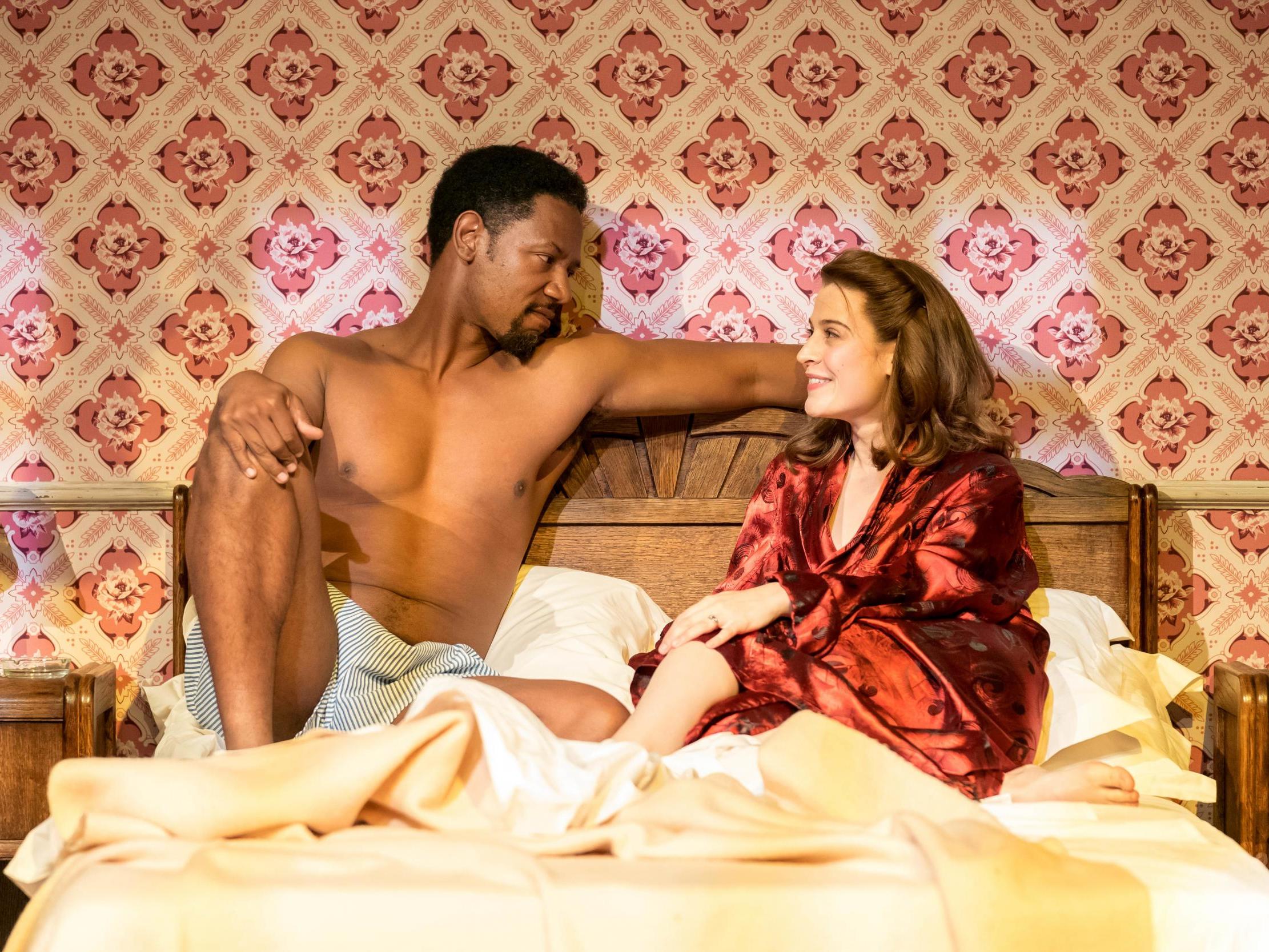8 Hotels, Minerva Theatre review: Elegantly provocative and alive with wiry delicacy
In an era of virulently born-again ‘white supremacy’ in the US, we have Nicholas Wright to thank for coming to the topic of Othello, show business, and race anew

Your support helps us to tell the story
From reproductive rights to climate change to Big Tech, The Independent is on the ground when the story is developing. Whether it's investigating the financials of Elon Musk's pro-Trump PAC or producing our latest documentary, 'The A Word', which shines a light on the American women fighting for reproductive rights, we know how important it is to parse out the facts from the messaging.
At such a critical moment in US history, we need reporters on the ground. Your donation allows us to keep sending journalists to speak to both sides of the story.
The Independent is trusted by Americans across the entire political spectrum. And unlike many other quality news outlets, we choose not to lock Americans out of our reporting and analysis with paywalls. We believe quality journalism should be available to everyone, paid for by those who can afford it.
Your support makes all the difference.The role of Othello has got to be considered one of the summits of a great actor’s career, correct? And particularly so, for a great actor of colour? The stage history of Shakespeare‘s tragedy suggest there has often been a flaw in this logic. Consider the case of the American-born Ira Aldridge (1807-1867), who found himself the victim of terrible racist double standards when he was drafted in to replace the indisposed Edmund Kean in the part. The latter had been celebrated for the “amazing transformation” he had achieved as Othello. Aldridge’s portrayal was slighted because (it was alleged) he was “merely revealing [his] own nature”. He was accused of “pawing” the heroine.
In an era of virulently born-again “white supremacy” in the US, we have Nicholas Wright to thank for coming to the topic of Othello, show business, and race anew – from a fresh, astringent and canny angle in his new play 8 Hotels. Premiered in a deeply considered and emotionally compelling production by Richard Eyre, the play starts in 1944 and keeps track of the cross-country tour of an Othello starring Paul Robeson (1898-1976), who is still best known in this country for his signature rendition of “Ol’ Man River”. Wright widens the focus by emphasising how steadfastly Robeson fought to speak for his people through overt activism as well as through the political gesture of acting in plays. And, with eloquent economy, he eschews the normal habit of shifting between the difficult dynamics of offstage and onstage.
Wright confines the drama to the hotel rooms of the title. Greasy moquette, a sloping ceiling that gives it the look of a flyover, Rob Howell’s evocative design conjures up all the various bedrooms, while on either side very well chosen period-footage whizzes us between Indianapolis, Cleveland, Winnipeg et al. If the play eventually transfers to the US, I doubt that the 45th president will be rushing to tweet his compliments. With its salutary historical insights, the piece feels continuous with the appallingly retrograde situation right now. It’s liberated by its ostensible confinement. Hotel bedrooms are arousing; so is life on tour. Peevish managements can make life impossible for patrons they consider “undesirable”.
Through beautifully distributed hints, it becomes evident that Tory Kittles’ Robeson is having an affair with Uta Hagen (Emma Paetz). The actress playing Desdemona happens, in real life, to be the partner of Jose Ferrer the Puerto Rican actor playing Iago. This handsome, complacent but suspicious figure went to Princeton on the proceeds of a family fortune that depended, it emerges, from the owning of slaves. Ben Cura, who captures him very well, has a wonderful mutually mistrustful good-pals-act with the impressive Skittles. All three actors, along with Pandora Colin as the very English director of the Othello, excel at suggesting the future selves that these professionals will become, when famous. They intimate very skilfully how the emotional vicissitudes of this particular tour may have played a key role in that development.
The scenes extend beyond the 1944 tour to hotel-room encounters during the crusade against communism of the 1950s and the scandal of the McCarthy hearings. Did Ferrer, by now a movies star, name Robeson to the UnAmerican Activities as belated revenge for being cuckolded? Uta Hagen went on to become a great actress and a celebrated teacher of acting – her idealistic ardour about her craft perfectly conveyed in the impulsive quickness of Paetz’s performance. Acting can batten off unfortunate real-life experience. That’s important to this play’s theme and scheme. I won’t spoil things for you but we hear that when Hagen, at short notice, has to play Blanche Dubois to Brando’s Stanley in A Streetcar Named Desire, she releases the character’s fear by drawing on an inexcusable moment that we’ve seen dramatised in her relationship with Robeson.
The latter is shown as happier making contact with the crowd at rallies (as I said, the play is full of continuities and inversions). We last see him badly broken but unbowed after the State Department has taken away his passport and the major part of his livelihood because of he persisted in trips to the Soviet Union. Why did Robeson refuse to tell the truth that this idealistic project had become a tyranny? Worrying away again at the connections between performance and different kinds of betrayal, the play strives to understand, without condoning, his reluctance to apologise as a painful symptom of the Cold War: you can’t denigrate one way of life without whitewashing the other. Elegantly provocative, alive with wiry delicacy, 8 Hotels cries out for a transfer.
'8 Hotels' is showing at the Minerva Theatre in Chichester until 24 August
Join our commenting forum
Join thought-provoking conversations, follow other Independent readers and see their replies
0Comments